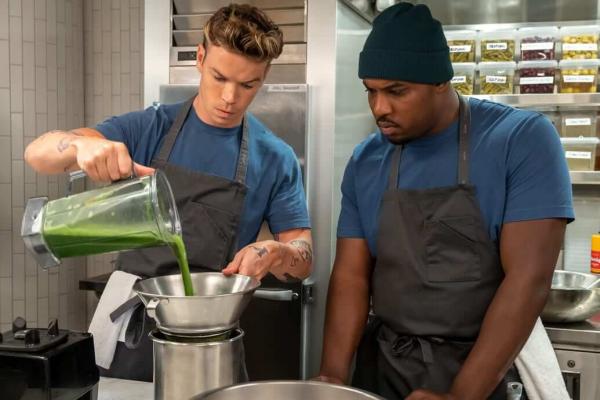I can’t quit thinking about Peter’s dream in the book of Acts. Maybe because I’m a barbecue fan.
Peter falls asleep while he’s hungry and sees a sheet descend from the skies. It’s weighed down with all kinds of animals. Then God says, “Get up, Peter; kill and eat” (10:13). Peter is scandalized; the animals on the sheet are all unclean, and therefore forbidden for a faithful Jewish man like Peter to consume. Peter objects: “By no means, Lord; for I have never eaten anything that is profane or unclean” (10:14). But God is persistent (for some reason, it usually takes Peter three times before something sinks in): “What God has made clean, you must not call profane.”
When Peter wakes up, the Holy Spirit tells him some men have shown up at his house. They’ve been sent by a Gentile named Cornelius, who tasked them to bring Peter to him. Normally, a Jewish man like Peter would demure. Gentiles are unclean. Jewish people tended not to share meals with Gentiles or even enter their homes. But that dream is ringing in Peter’s head: “What God has made clean, you must not call profane.” So, Peter agrees to go.
I wonder what was going through Peter’s mind as he made the day-long journey to meet Cornelius. This fisherman-turned-fisher-of-men had found himself at the center of a storm of change. Since Jesus was raised from the dead and ascended to heaven, Peter had become one of the leaders of the fledgling church. He and the other apostles found themselves coping with explosive growth, which taxed their meager resources. And now the church is set to grow and change even more: Peter is on the way to meet with Gentiles — people historically excluded from the Jewish community (which included the church, at that point comprised wholly of Jewish peoples).
Change is at the heart of the hit FX series The Bear, too. The first season introduced us to Carmen Berzatto (an intense, reserved Jeremy Allen White), who was the chef de cuisine at one of the best restaurants in the world. Carmy, as his family calls him, has returned to Chicago to take over The Original Beef, a restaurant previously run by his now-deceased brother Michael. Carmy and his new sous chef Sydney (Ayo Edebiri, delivering a powerful, vulnerable performance) want to elevate The Beef, to make it into a must-visit destination. They face not only the chaos left in the wake of Michael’s death, but also the reticence of a staff who is mired in grief and skeptical about learning what it takes to work in a fine-dining kitchen. By the end of the first season, however, everyone has come together to believe in Carmen and Sydney’s dream. They shutter The Beef, promising that it will return as The Bear.
Season two, streaming on Hullu, charts the contours of this change. Behind and beneath the practical questions about plates, forks, and fire suppression systems is a larger, more existential question about the continuing viability of the restaurant as an institution. Even as they struggle to open on time and on budget, they get news of restaurant after restaurant that is closing, to say nothing of all those that didn’t survive the COVID-19 pandemic. In this day and age, even a very good restaurant struggles to survive; thriving is a pipe dream.
And in this way, the restaurant industry doesn’t sound so different from Western Christianity. As of 2020, church attendance in the U.S. fell below 50 percent for the first time in the nation’s history, according to a Gallup poll. And with ever more churches closing their buildings or converting them to uses other than worship, many pastors face the looming question: What is to become of the church in the U.S.?
Our current church growth model — centered on attracting seekers by offering a palatable Jesus (for white suburbs) — has not reliably delivered churches that are growing or healthy, nor has it made disciples of all peoples. Quite the opposite: The fact that the overwhelming majority of white evangelicals cast their ballots for a self-confessed, unrepentant sexual predator not once but twice is strong evidence of a discipleship crisis. But that does not mean the Holy Spirit is not working in the U.S. It may be that, like Peter, we need to look outside the institutions and systems we’ve known. As Jesus told Nicodemus, the Spirit is like a wind blowing where she chooses (John 3:8).
And sometimes she blows to Denmark. In the fourth episode of The Bear’s second season, titled “Honeydew,” Carmen and Sydney send their pastry chef Marcus (Lionel Boyd) to learn from Chef Luca (Will Poulter) in Denmark. Marcus marvels at the creativity with which Luca creates beautiful, delicious desserts unlike anything Marcus has experienced. In awe, Marcus asks Luca how he became “Chef Luca.”
Luca recounts a surprising story about his early days as a chef, when his mission was to prove he was better than every other chef in the kitchen. Then he met someone who was far better than he could ever be. Working with that chef broke something in Luca, or maybe more accurately, broke him away from something: the drive for perfection.
Luca muses, “It was the first time I realized I wasn’t the best and I was never going to be the best … I think at a certain stage it becomes less about skill and more about being open … to the world, to yourself, to other people. Most of the incredible things I’ve eaten haven’t been because the skill level was exceptionally high or there’s loads of mad, fancy techniques; it’s because they were it’s been really inspired … You can spend all the time in the world in here, but if you don’t spend enough time out there…” Luca shrugs, indicating that a chef achieves true greatness in the kitchen only by leaving the kitchen.
Greatness isn’t about perfection, but openness — a posture toward the larger world that points away from our own needs and desires and toward the other, the “profane or unclean.”
When Peter enters the home of Gentiles, he realizes that God’s plan was far more audacious than Peter had imagined. God didn’t seek to change or cleanse the Gentiles, God intended to welcome them as they already were.
Peter finds himself exclaiming, “Can anyone withhold the water for baptizing these people who have received the Holy Spirit just as we have?” Because Peter has followed the Holy Spirit’s leading, because he’s left the spaces that were his and ventured into Gentile territory, into the land of the profane, he witnessed God’s plan for the fledgling church — a plan that was bigger than Peter or any of the other apostles could envision.
As our churches in the U.S. face rapid cultural shifts, may we have the courage to turn from our self-interest and the comfort that comes with what has been. We can spend all the time we want in our buildings, chasing the perfect programs, outreach models, discipleship programs, and preaching rubrics, but until we go out there and attend to the still, small voice of the Spirit, blowing in her unpredictable ways — among the economically oppressed, among the queer, among the very groups the church has long labelled both literally and metaphorically unclean, we’ll miss the good, ongoing work God has prepared for us. As Luca told Marcus, it is “less about skill and more about being open… to the world, to yourself, to other people.” That’s true for good food, and that’s true for good churches.
Got something to say about what you're reading? We value your feedback!







